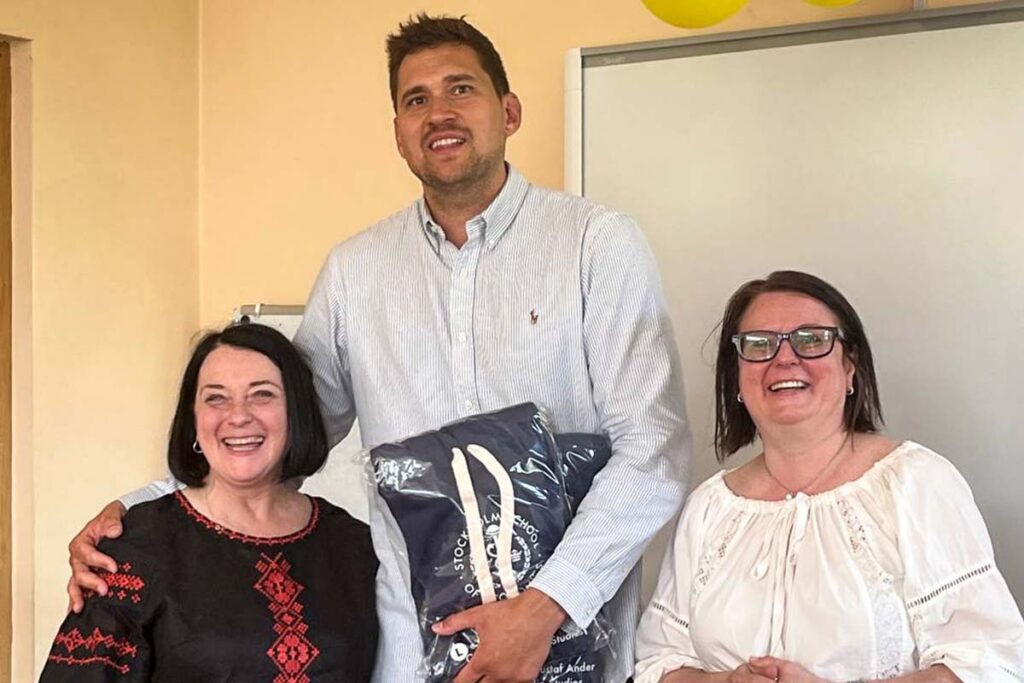In a country ravaged by war, where media plays a crucial role in informing, educating, and holding power to account, media organisations face extreme challenges. Ukrainian media outlets are facing a steep decline in revenues, staff fleeing, destroyed infrastructure, and constant security threats to journalists. At the same time, they are expected to serve as both information providers and democratic watchdogs in an increasingly polarised global information landscape.
Against this backdrop, the Fojo Media Institute at Linnaeus University, in collaboration with the Institute of Journalism at Taras Shevchenko University in Kyiv and the Stockholm School of Economics in Riga, launched the EUMM training programme for Ukrainian media leaders. Participants include senior managers from both national and regional media houses, as well as lecturers from the journalism institute.
Strong Engagement from Participants
Launched in March this year, the programme is funded by the Swedish Institute’s SI Ukraine Cooperation Programme as part of SI’s broader mission to support democratic development in Ukraine. The curriculum has focused on strategic leadership, financial sustainability, crisis communication, team development, marketing, and the integration of AI tools into editorial workflows.
With both Ukrainian and international experts as lecturers, the programme has helped equip media houses with the knowledge and strategies needed to strengthen their resilience – both during wartime and in future reconstruction phases.
The final module of the course was held in Kyiv in June. Despite repeated air raid alerts in the capital, the training continued uninterrupted – a clear testament to the participants’ determination and commitment to media development, even under threat.
“We haven’t only talked about media,” says Andrii Bystrov, Programme Director at Ukrainska Pravda and one of the participants. “We’ve talked about survival. About adapting to new realities. About building trust with the audience. And about leadership as the ability to inspire your team – even in the midst of darkness.”
Critical Skills for Ukrainian Media in a Rapidly Changing Wartime Environment
The final module was led, among others, by Gaigysyz Geldiyev from Jnomics Media.
“It was a privilege to lead sessions in Kyiv alongside some of the most resilient leaders within Ukraine’s independent media. Not in a protected bubble – but in the chaos of real life,” says Geldiyev. “What moved me most wasn’t the questions or case studies – it was the courage and determination to keep building, no matter the circumstances.”
One key takeaway from the programme was the importance of being able to make informed and strategic decisions in times of uncertainty – a vital competence for Ukrainian media operating in the shifting realities of war.
A Practical and Dynamic Programme
“We are confident that the participants return to their newsrooms better equipped, with boosted confidence and a broader national and international network. That’s the essence of the programme: to help Ukrainian media remain resilient, relevant and impactful despite constant pressure,” says Veronika Menjoun, project lead at the Fojo Media Institute.
“We didn’t work with ‘typical students’, but with experienced managers who are already making crucial decisions in their newsrooms,” says Edgars Spuravs, Head of the Media Centre at the Stockholm School of Economics in Riga.
“That’s why the programme was practical and dynamic – not academic.”
The organisers also emphasise the importance of anchoring knowledge locally to ensure long-term impact.
“We believe in education rooted in reality. And we want programmes like this to be born and grow here in Ukraine,” says Yuliia Nesteryak, Ukrainian Programme Coordinator and Associate Professor at the Institute of Journalism.
The programme is a cooperation between the Fojo Media Institute (Linnaeus University, Sweden), the Stockholm School of Economics in Riga, and the Institute of Journalism at Taras Shevchenko University in Kyiv, with financial support from the Swedish Institute. Its aim is to strengthen the strategic, financial, and leadership capacities of Ukrainian media managers during a time of full-scale war.
Applications for the next round of Educating Ukrainian Media Managers (EUMM) opened the first week of September.
A new call for applications within the SI Ukraine Cooperation Programme will open towards the end of the year. Read more about the programme here: SI Ukraine Cooperation Programme – Svenska institutet
